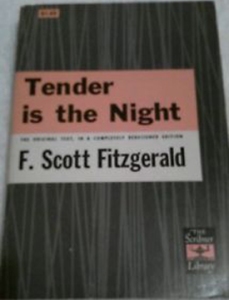From the opening page, Tender is the Night plops you down in the world of rich people and those who are allowed to cavort with rich people. It’s a world I find mildly interesting on an intellectual level, but off-putting and mostly unpleasant on a gut level. Because these are folks I mostly didn’t enjoy spending time with, I found the book at times a chore to get through. There are certain aspects of the story that intrigued me, but frankly not enough.
I actually like The Great Gatsby quite a lot, so it’s not as if nothing Fitzgerald writes about rich people is capable of appealing to me. I not only like that book, I like Gatsby himself, and mostly like the narrator Nick. These are folks I would indeed find interesting to have in my life. The only character I sort of connected with in Tender is the Night is Dick Diver, and it took over half the book to get to know him well enough for me to feel even that limited connection, whereas Gatsby drew me in pretty much from the beginning.
Most of the story takes place in Europe, with most of the characters being (rich) Americans living or traveling abroad.
The book opens with a teenage actress (Rosemary), who apparently is kind of on the edge of being the “next big thing,” traveling in Europe with her mother. They—or mostly Rosemary; the mother hangs back—fall in with a group of beautiful people types, informally led by Dick Diver. He’s a psychoanalyst, but like everyone else in that crowd rarely if ever seems to work, but instead makes a full time job out of being suave and giving fancy parties. Rosemary immediately falls for the (married) Diver.
I suppose one of the valuable things about a book like this is just the sociological insight it gives into what a certain class of people was like during a certain historical period—their customs, values, speech patterns, etc.
Then again, that assumes that novels are accurate, not about specific people and events—that’s what makes fiction fiction—but at least about the milieu in which the events occur. Many people would say not only are they not accurate in that sense, but they have no obligation to be, since, again, they’re fiction. I tend to disagree and to hold instead that the default is that there is an obligation to be accurate, with various considerations that can allow for exceptions.
My guess in this case is that Fitzgerald was trying to be accurate in his depiction of what folks like this were like, and that he mostly succeeded. That is indeed just a guess, but that’s the assumption I had when reading this material.
If that’s true, one surprising (to me anyway) aspect of life among the rich back then was the casual attitude about casual sex, including infidelity. It’s not that everyone is sleeping with everyone in a wide open wife-swapping kind of way in this book, but it’s more that it’s just kind of understood that “things happen” now and then. And it’s all done—the flirting, the infidelity, the reactions to the infidelity, etc.—in an “oh so proper” way, like passion, emotion, and morals must never be allowed to violate social etiquette.
Rosemary’s mother’s reaction to her teenage daughter’s infatuation with an older, sophisticated, debonair, married man is pretty much to endorse it. Her attitude isn’t so much that it’s a promising situation in the sense that they’ll likely end up together living happily ever after, but that it’s just a part of life to have passionate love affairs when you’re young, and her daughter might as well start now and let things play out however they’re going to play out, and gain the life experience that comes with that.
Follow your heart and take what comes, even if it involves a dalliance with an older, married man. That’s an uncommonly liberal attitude today, let alone—I would have thought—the 1920s.
Anyway, the book skips around a bit chronologically, as we then get the backstory on Diver and his wife Nicole.
It turns out Nicole was a patient where Diver received part of his education. She had bouts of being detached from reality, probably to the degree of being schizophrenic, evidently brought on by childhood abuse. She and Diver made a connection that seemed to help her. They eventually got married, but it turned out she really wasn’t cured and still periodically went nuts.
Dealing with her insanity, not to mention with the dynamics of having married into money (not that Diver was poor to start with, but apparently Nicole came from serious money, and the fact that it was really her money that paid for their idle rich lifestyle was a source of friction in Diver’s relationships with her and members of her family, not to mention generating some guilt or self-doubt within him), wears on Diver more and more as the years go by. His drinking gets increasingly out of control, and he becomes increasingly irresponsible.
What had been the story of carefree rich people at play led by the supremely charismatic Diver, turns out upon closer examination to be the story of the gradual deterioration of a man under pressure, and the gradual deterioration of a marriage.
Of course a lot of this parallels Fitzgerald’s own life—the partying in Europe with the beautiful people, the alcoholism, the mentally ill spouse, etc.
I read later that this book was re-issued posthumously, totally reorganized to be chronological, based on Fitzgerald’s own notes for a possible revision. I haven’t read that version, but my initial thought is that it would be inferior.
To me, there’s a legitimate reason for the novel to be structured the way it is. In the beginning (the beginning of the book, not the chronological beginning), we see Diver at his peak, indeed maybe even an exaggeration of his peak, as we’re seeing him through the eyes of an impressionable, lovestruck teenage girl. He is the Gatsby-like figure of great magnetism, the man men want to be like and women want to be with. It’s presented as the most natural thing in the world that a hot teenage celebrity with her pick of suitors would offer herself to him sexually almost immediately upon meeting him.
But then the rest of the book chips away at this perception. We see him change, we see him fall. But really we see that he was never up so high to begin with. Yes there’s a decided deterioration, but even at his peak he was troubled and flawed in ways Rosemary was too inexperienced to see, as was his marriage, as was that whole class of people.
I think if you put the meeting and partying with Rosemary in the middle of the book or wherever it would fall chronologically, you lose that sense of gradual enlightenment, of having reality slowly emerge and crowd out the illusion.
One reaction I had to this book, which I recall having had to This Side of Paradise as well, is that there are plenty of interesting turns of phrase and little comments and such that either are insightful and profound, or create the illusion that they are. I can see why his writing would be greatly praised, but I’m left in kind of a state of agnosticism as to whether it is good writing or merely faux good writing.
For example, a character is described as adopting “an expression of devastating irony.” An interesting phrase for sure, but then I think about it and I realize I have no clue what it means. How do you express irony with a facial expression? If this were being acted out in a play or a movie, what would the actor do? Does it refer to sneeringly looking down your nose at somebody and judgmentally raising an eyebrow a bit? I don’t know; I’m just guessing.
And even if there is such an expression, how would one do it “devastatingly”? Is it an exaggerated version of a sneer? Can you imagine being “devastated” by being looked at like that? (I’m picturing a kind of Snidely Whiplash thing, and I think I’d be more inclined to laugh than to feel devastated if somebody looked at me like that.)
I’m not denying it means something; I’m just saying I honestly don’t know to what he’s referring with that phrase, so I’m undecided whether it’s an excellent and pithy description or total nonsense or something in between.
Or how about “Like most women she liked to be told how she should feel”? Really? Women like to be told how to feel?
Maybe. But again I’m just not sure if that’s an insightful psychological or sociological comment about that half of the world’s population, or just something he pulled out of his ass.
I’m inclined to think it could have some truth to it as a statement about the very human inclination to conform—the way we, consciously or more often unconsciously, look to our peers for cues for what to believe and how to respond to something emotionally, to make sure we fit in with those we want to fit in with—but is that inclination really that much stronger in women than in men? Or was it stronger in women than in men back in Fitzgerald’s time? Or perhaps stronger in women than in men in specifically the privileged circles that Fitzgerald traveled in and wrote about back then?
Again, I don’t know. It’s possible it’s a wise and accurate piece of social commentary, and it’s possible it’s baloney. I’m not convinced either way.
Tender is the Night is an intelligent book, and it does provide much to think about, so even though I didn’t find it all that engrossing I’m not going to say it isn’t worthwhile. But just for my personal tastes, I would rank it well behind The Great Gatsby, and slightly ahead of This Side of Paradise, the other two Fitzgerald novels I’ve read.


I really want to read this 😀
LikeLike
Thanks for the comment Shannon. Have you read The Great Gatsby or anything else by Fitzgerald?
I was drawn in by your blog and have enjoyed looking through it. I love your enthusiasm and your attachment to good books. Always nice to hear from a fellow bibliophile. You come across as a very likable, bright person with a great attitude. I’m planning on making at least a couple comments.
LikeLike
Yeah I have read The Great Gatsby and I really liked it, awe thank you so much for your kind words. I look forward to reading your comments.
LikeLike